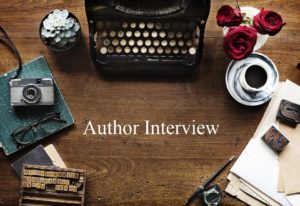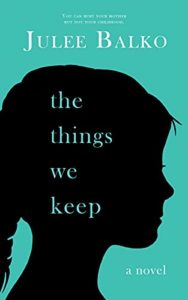An Interview with Julee Balko
 Readers agree that 2021 Debuts author Julee Balko knows how to write relationships. One reviewer wrote of her debut novel, The Things We Keep, that Julee crafted “a story with really complicated family dynamics,” while another reader said, “Complex relationships can really take a toll on us . . . The author has brilliantly written about such a mother-daughter relationship in this story.” Such praise is exactly what authors love to hear, especially when life keeps you hopping—and in Julee’s case, that’s a cross country move with three kids and a large dog right after a book releases! That resiliency will be useful going forward as Julee writes her next book, which she hopes to have finished by winter. Like every author I have interviewed, Julee has a very full plate, so I’m quite thankful she took a time to thoughtfully answer my questions.
Readers agree that 2021 Debuts author Julee Balko knows how to write relationships. One reviewer wrote of her debut novel, The Things We Keep, that Julee crafted “a story with really complicated family dynamics,” while another reader said, “Complex relationships can really take a toll on us . . . The author has brilliantly written about such a mother-daughter relationship in this story.” Such praise is exactly what authors love to hear, especially when life keeps you hopping—and in Julee’s case, that’s a cross country move with three kids and a large dog right after a book releases! That resiliency will be useful going forward as Julee writes her next book, which she hopes to have finished by winter. Like every author I have interviewed, Julee has a very full plate, so I’m quite thankful she took a time to thoughtfully answer my questions.
Christina: You wrote The Things We Keep “after being thrust into the world of grief when [your] mother and father died” because “there needed to be a book that showed this often not-talked-about journey.” What made you decide to write fiction over memoir or some other genre?
Julee: Throughout my life, I’ve always loved getting lost in a novel. I often found I could understand my feelings through a good story. My mom died when my first child was only one. None of my friends understood what I was going through. And I felt like grief was such a strange and lonely experience. I wished I had a good book that let me delve into my feelings and maybe cry a bit as an outlet. Often, death in books is written as a few sentences and then the characters seem to walk on unscathed. I realized grief was something people silently carry with them, and I thought maybe my novel could help them know they aren’t alone. I love writing creatively, so fiction was a natural choice for me.
Christina: Serena, the main character of the book, says, “She didn’t have the ‘let’s go shopping’ type of relationship with her mother. She had space, hate, and uncertainty . . .” That complicated, messy, mother-daughter relationship will resonate with more than a few readers because of its authenticity. How did you capture that authenticity? Do you find writing about motherhood compelling? If so, why?
Julee: I always joke that complicated mothers create many writers. And my mother was indeed a complicated woman but she was also loving—and actually loved to go shopping. But there were times when our relationship was very tough and as a writer, it’s the difficult parts of people that I pay attention to. So I started crafting my novel with ideas that could show how this mother and daughter were distant from each other. What are the small ways you can tell that people don’t get along? What are the big ways we pull away from each other? There are so many people in my life who have trouble with their mothers and it can have such a profound effect on your life, so I used their real experiences as my inspiration as well.
I also have three girls of my own and my relationship with them helped me craft Serena’s relationship with Maggie. We view our own mother differently when we have a child of our own. And there is an appreciation, too, that comes along with this new perspective. I love being a mom, so motherhood is one of my favorite things to write about. It is a complicated relationship both with our child and within ourselves.
Christina: The book begins with a short prologue, the end of which states: “That’s the thing with grief, it keeps you distant and then shockingly close all at the same time.” What a lovely and sad statement, but one that is so true. How did you balance the distant and the close in the book? Was it difficult to do?
Julee: I came up with that line when I was playing pinball with my daughter. I hadn’t played in years and my daughter was surprised I was so good at it. I told her I used to play with my mother and then I had a flood of memories that I hadn’t thought about in forever. I realized grief puts our memories in boxes and keeps them closed until something triggers them to open.
I used the flashbacks in the novel to illustrate how grief opens up a memory. It was tricky to do while also keeping the reader engaged in the story. The book starts with many memories that then lessen as Serena finds her way forward and makes peace with her past, because I think that’s how grief works. When the novel starts, Serena is more distant from her family, but as it progresses I think she becomes closer to her past and that opens her heart too.
Christina: Grief can be overwhelming and paralyzing. What are some tips to share with those who don’t know where to start in processing their grief?
Julee: Grief is so strange. Suddenly the whole landscape of your life looks different, but you are supposed to walk the same path forward. My advice would be to have grace with yourself. There is no timeline to grief. There’s no deadline for sadness. It’s ok to put yourself first and look out for yourself. Now is the time to say no to anything that you don’t want to do. But say yes to anyone who offers to bring you food or help. Taking care of the basics of your health (eat, sleep, etc.) is so important to getting through the first few weeks of fog and sadness. Most people don’t know how to talk about death and will do anything to avoid it. But it’s so important to keep talking about the person you lost and how you are feeling. If you have someone you can talk to—a friend, therapist—talk. Don’t carry your grief alone.
Christina: Taking care of a family member in their time of need is, in my opinion, a privilege, but it’s also a humbling experience. What did you learn from your experiences with your family? Did anything surprise you?
Julee: I wrote this book years after my mother died. But I wound up editing it months after my father passed. Because of COVID I was separated from my father and couldn’t visit him in the hospital as he struggled after a bone marrow transplant. When I was finally able to see him, it was to bring him home for hospice. And we were so happy to be with each other. We laughed more than I think anyone would expect to in their final days. But we made the most out of each moment and created some of the most beautiful memories that I cherish to this day. I never knew death could feel so much like love.
Christina: In addition to novels, you write teacup poetry. What about that type of writing appeals to you? Do you approach the writing process for each the same way? Have any of your poems launched ideas for a novel?
Julee: I started writing poetry because a dear writer friend, Jacki Graham, started a weekly poetry battle on Twitter. I realized quickly how much I loved it. I tend to write honestly and straight from my heart—whether it’s a novel, essay, short story or poetry. It just flows. Poetry lets me release little moments inside myself and it feels like a form of therapy. No poems have launched a novel, but my poetry definitely takes on whatever I’m noticing about life. I like to capture the small moments that have big feeling.
Christina: You’re a fellow animal lover who lives with “a rescue hound, an inquisitive bunny” and foster kittens. Do these animals inform your writing? What’s the greatest lesson you’ve learned from your animals?
Julee: This is a great question to end on because my next novel, which I’m finishing up now, actually has a foster dog in it. I love writing about complex relationships and the dog in the story was such a wonderful way for the main character to learn more about herself. I think animals have so much simple trust and love that they can remind us humans to let our guards down. I’ve fostered over 30 cats and dogs. Every animal opens my heart and reminds me that kindness builds trust. Even the toughest foster became a friend by the time they left our house. It’s why I let my kids foster kittens. What a wonderful lesson it is to help something and put a little furry love into the universe.
Julee can be found in multiple places!
Website: https://www.juleebalko.com/
Instagram: @juleebalko
Twitter: @misplacedcomma2
Thanks to Julee for agreeing to this interview! If you know of an author who’d like to be featured in an interview (or you are an author who would like to be featured), feel free to leave a comment or email me via my contact page.


Love reading how others are responding to your book, Julee, and the insight behind the words. You are an amazing writer and I am honored and blessed to be your friend!!!